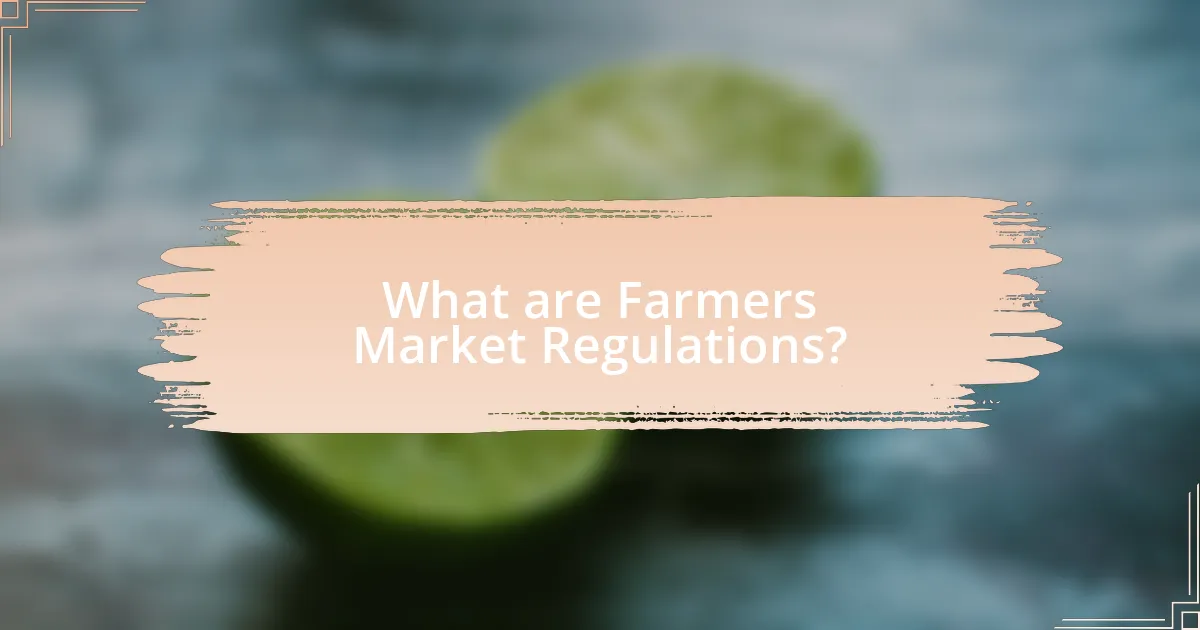Farmers market regulations are essential guidelines established by various authorities to ensure the safety, quality, and legality of products sold at these markets. This article outlines the importance of these regulations for vendors, including compliance with food safety standards, vendor licensing, and product labeling, which help protect consumer rights and promote fair competition. It also addresses the risks vendors face without adherence to these regulations, such as legal penalties and reputational damage. Additionally, the article discusses the types of regulations that exist, the role of local health and safety codes, and resources available for vendors to navigate compliance effectively.

What are Farmers Market Regulations?
Farmers market regulations are rules and guidelines established by local, state, and federal authorities to ensure the safety, quality, and legality of products sold at farmers markets. These regulations typically cover aspects such as food safety standards, vendor licensing, product labeling, and health inspections. For instance, the USDA provides guidelines that require vendors to comply with local health department regulations, which may include obtaining permits and adhering to specific food handling practices. Compliance with these regulations helps maintain consumer trust and promotes fair competition among vendors.
Why are regulations important for farmers market vendors?
Regulations are important for farmers market vendors because they ensure food safety, promote fair competition, and protect consumer rights. These regulations establish standards for product quality, labeling, and hygiene, which help prevent foodborne illnesses and build consumer trust. For instance, the U.S. Food and Drug Administration (FDA) mandates that food sold to the public must meet specific safety standards, thereby safeguarding public health. Additionally, regulations help create a level playing field among vendors by enforcing rules that prevent unfair practices, such as misleading advertising or selling non-local products as local. This fosters a fair marketplace, benefiting both vendors and consumers.
What risks do vendors face without adhering to regulations?
Vendors face significant risks without adhering to regulations, including legal penalties, financial losses, and reputational damage. Non-compliance can lead to fines imposed by regulatory bodies, which can range from hundreds to thousands of dollars depending on the severity of the violation. Additionally, vendors may be subject to product recalls or shutdowns, resulting in lost sales and operational costs. Furthermore, failure to meet health and safety standards can harm a vendor’s reputation, leading to decreased customer trust and loyalty. For instance, a study by the Food and Drug Administration indicates that non-compliance with food safety regulations can result in a 30% drop in customer retention for affected businesses.
How do regulations protect consumers at farmers markets?
Regulations protect consumers at farmers markets by ensuring food safety, product authenticity, and fair trading practices. These regulations often require vendors to adhere to health standards, such as proper food handling and storage, which minimizes the risk of foodborne illnesses. For example, many states mandate that vendors obtain permits and undergo inspections to verify compliance with local health codes. Additionally, regulations may require labeling of products, which helps consumers make informed choices about the origin and ingredients of the food they purchase. This transparency is crucial for maintaining consumer trust and ensuring that products meet quality standards.
What types of regulations exist for farmers markets?
Farmers markets are subject to various regulations that ensure food safety, fair trade practices, and operational standards. These regulations typically include health and safety codes, which mandate that vendors comply with food handling and sanitation requirements to protect consumer health. Additionally, zoning laws may dictate where farmers markets can operate, ensuring they are located in appropriate areas. Licensing and permits are also required for vendors to legally sell their products, which may vary by state or local jurisdiction. Furthermore, some markets enforce rules regarding product sourcing, often requiring that items sold be locally produced or grown. These regulations are designed to maintain quality, safety, and fairness within the marketplace.
What are the local health and safety regulations vendors must follow?
Vendors must follow local health and safety regulations that typically include food safety standards, sanitation requirements, and proper labeling practices. These regulations are enforced by local health departments to ensure that food sold at farmers markets is safe for consumption. For example, vendors may be required to obtain permits, maintain proper food storage temperatures, and adhere to hygiene practices such as handwashing and using gloves. Compliance with these regulations is crucial, as violations can lead to fines or the closure of the vendor’s stall, thereby impacting their business operations.
How do zoning laws impact farmers market operations?
Zoning laws significantly impact farmers market operations by dictating where these markets can be established and how they can function. These regulations determine the types of activities allowed in specific areas, influencing factors such as location, hours of operation, and the types of products that can be sold. For instance, a study by the American Planning Association highlights that markets located in commercial zones often have fewer restrictions compared to those in residential areas, which may face limitations on noise, traffic, and signage. This regulatory framework can either facilitate or hinder the success of farmers markets, affecting vendor participation and consumer access.
How can vendors find out about specific regulations?
Vendors can find out about specific regulations by consulting local government websites and agricultural departments that provide guidelines for farmers markets. These resources typically outline the necessary permits, health codes, and safety standards required for vendors. For instance, the USDA and state agricultural agencies often publish detailed regulations that vendors must adhere to, ensuring compliance with local laws. Additionally, attending workshops or informational sessions hosted by farmers market associations can provide valuable insights into regulatory requirements specific to their area.
What resources are available for understanding local regulations?
Local regulations can be understood through several key resources. Government websites, such as state and local health departments, provide specific guidelines and requirements for vendors at farmers markets. Additionally, local agricultural extension offices offer resources and support tailored to regional regulations. Nonprofit organizations focused on local food systems often publish guides and host workshops that clarify regulatory frameworks. Furthermore, legal aid organizations may provide free or low-cost consultations to help vendors navigate compliance issues. These resources collectively ensure that vendors have access to accurate and relevant information regarding local regulations.
How can vendors connect with local agricultural extension offices?
Vendors can connect with local agricultural extension offices by visiting their official websites or contacting them directly via phone or email. Agricultural extension offices often provide resources and support for vendors, including information on regulations, best practices, and market opportunities. Many extension offices also host workshops and events that vendors can attend to network and gain insights into local agricultural practices and regulations.

What are the Common Challenges Vendors Face?
Vendors commonly face challenges such as navigating complex regulations, managing supply chain issues, and ensuring product quality. These challenges arise from the need to comply with local health and safety standards, which can vary significantly between regions. For instance, a study by the USDA highlights that 70% of farmers market vendors report difficulties in understanding and adhering to food safety regulations. Additionally, vendors often struggle with inconsistent demand, which can lead to overproduction or stock shortages, impacting their profitability.
What are the most frequent compliance issues for vendors?
The most frequent compliance issues for vendors include failure to obtain necessary permits, non-compliance with health and safety regulations, and improper labeling of products. Vendors often neglect to secure local permits required for selling at farmers markets, which can lead to fines or removal from the market. Additionally, adherence to health codes, such as food safety standards, is critical; violations can result in health department citations. Lastly, accurate labeling of products, including ingredient lists and allergen information, is essential to comply with consumer protection laws. These compliance issues are documented in various studies, including the “Farmers Market Compliance Study” by the USDA, which highlights the importance of regulatory adherence for market success.
How can vendors avoid common pitfalls in regulation compliance?
Vendors can avoid common pitfalls in regulation compliance by thoroughly understanding and adhering to local, state, and federal regulations relevant to farmers markets. This includes researching specific licensing requirements, health and safety standards, and labeling laws that apply to their products. For instance, the USDA provides guidelines on food safety that vendors must follow to ensure compliance. Additionally, maintaining open communication with market managers and participating in training sessions can help vendors stay informed about regulatory changes and best practices. Regularly reviewing compliance checklists and seeking legal advice when necessary further strengthens their adherence to regulations.
What documentation do vendors typically need to provide?
Vendors typically need to provide a business license, food safety certification, and proof of liability insurance. A business license ensures that the vendor is legally allowed to operate, while food safety certification demonstrates compliance with health regulations. Proof of liability insurance protects both the vendor and the market from potential claims. These documents are essential for meeting local regulations and ensuring safe operations at farmers markets.
How do seasonal changes affect regulations?
Seasonal changes significantly affect regulations governing farmers markets by influencing the types of products that can be sold and the compliance requirements for vendors. For instance, during peak growing seasons, regulations may relax to encourage the sale of fresh produce, while off-seasons may impose stricter guidelines to ensure food safety and quality. Additionally, local health departments often adjust inspection schedules and permit requirements based on seasonal availability of products, as seen in the USDA’s seasonal guidelines for farmers markets, which emphasize the importance of aligning regulations with local agricultural cycles.
What should vendors know about seasonal permits and licenses?
Vendors should know that seasonal permits and licenses are often required to legally sell products at farmers markets. These permits vary by location and can include health permits, business licenses, and specific permits for selling certain types of goods, such as food or crafts. For example, many states require food vendors to obtain a health department permit to ensure compliance with safety regulations. Additionally, vendors should be aware of application deadlines and any associated fees, as these can impact their ability to participate in the market. Understanding local regulations is crucial, as failure to obtain the necessary permits can result in fines or being barred from selling.
How can vendors prepare for changes in regulations throughout the year?
Vendors can prepare for changes in regulations throughout the year by actively monitoring regulatory updates and engaging with industry associations. Regularly reviewing local, state, and federal guidelines ensures that vendors remain compliant with evolving laws. For instance, the USDA and state agricultural departments frequently publish updates that can impact farmers’ markets. Additionally, participating in workshops and training sessions offered by agricultural extension services can provide vendors with insights into upcoming regulatory changes. This proactive approach not only helps vendors stay informed but also allows them to adapt their business practices accordingly, minimizing the risk of non-compliance and potential penalties.

What Best Practices Should Vendors Follow?
Vendors should follow best practices that include understanding local regulations, maintaining product quality, and ensuring proper labeling. Understanding local regulations is crucial as it helps vendors comply with health and safety standards, which vary by location. Maintaining product quality is essential for customer satisfaction and repeat business; studies show that high-quality products lead to increased sales and customer loyalty. Proper labeling, including ingredient lists and allergen information, is not only a legal requirement in many areas but also builds trust with consumers. These practices collectively enhance vendor credibility and operational success in farmers markets.
How can vendors stay informed about regulatory changes?
Vendors can stay informed about regulatory changes by subscribing to industry newsletters and following relevant government agencies on social media. These sources provide timely updates on new regulations and compliance requirements. For instance, the USDA and local health departments often publish changes that directly impact vendors at farmers markets. Additionally, attending workshops and conferences related to food safety and agricultural regulations can enhance vendors’ understanding of evolving legal landscapes. Engaging with local agricultural extension offices also offers access to resources and expert advice on compliance.
What strategies can vendors use to keep up with local regulations?
Vendors can keep up with local regulations by actively engaging with local government agencies and industry associations. Regular communication with these entities allows vendors to stay informed about changes in regulations, compliance requirements, and best practices. Additionally, attending workshops and training sessions offered by local agricultural departments or market associations can provide valuable insights into regulatory updates. Research indicates that vendors who participate in these educational opportunities are more likely to remain compliant and avoid penalties, as they gain a clearer understanding of the regulatory landscape.
How can networking with other vendors help in understanding regulations?
Networking with other vendors can significantly enhance understanding of regulations by facilitating the sharing of experiences and insights related to compliance. When vendors collaborate, they can exchange information about specific regulatory challenges they have faced, such as food safety standards or labeling requirements, which can vary by location. This collective knowledge helps vendors stay informed about the latest regulatory changes and best practices. For instance, a study by the USDA highlighted that vendors who actively engage in community networks are more likely to report higher compliance rates with local health regulations, demonstrating the practical benefits of such networking.
What tips can help vendors ensure compliance?
Vendors can ensure compliance by thoroughly understanding and adhering to local regulations governing farmers markets. This includes obtaining necessary permits, following health and safety standards, and ensuring product labeling meets legal requirements. For instance, the USDA mandates that vendors selling food must comply with food safety regulations, which include proper handling and storage practices. Additionally, vendors should regularly review updates to regulations and participate in training sessions offered by local health departments or farmers market associations to stay informed.
How can vendors create a checklist for regulatory compliance?
Vendors can create a checklist for regulatory compliance by identifying relevant regulations, breaking them down into actionable items, and organizing them systematically. First, vendors should research local, state, and federal regulations applicable to farmers markets, including health codes, labeling requirements, and licensing. Next, they should list specific compliance requirements, such as obtaining necessary permits, ensuring product safety, and adhering to labeling standards. Finally, vendors can format this information into a checklist, allowing for easy tracking and verification of compliance status. This structured approach ensures that vendors meet all necessary legal obligations while operating at farmers markets.
What role does training play in maintaining compliance?
Training plays a crucial role in maintaining compliance by ensuring that vendors understand and adhere to regulations governing farmers markets. Effective training programs equip vendors with the necessary knowledge about local health codes, food safety standards, and labeling requirements, which are essential for legal operation. For instance, a study by the USDA found that vendors who participated in compliance training were 30% more likely to meet regulatory standards compared to those who did not receive such training. This highlights the importance of ongoing education in fostering a culture of compliance and reducing the risk of violations.
What resources are available for ongoing support?
Ongoing support for vendors navigating farmers market regulations is available through various resources. These include local agricultural extension offices, which provide guidance on compliance with state and local regulations, and the USDA’s Farmers Market Promotion Program, offering funding and resources for market development. Additionally, organizations like the Farmers Market Coalition offer educational materials and networking opportunities to help vendors stay informed about best practices and regulatory changes. These resources are essential for ensuring that vendors can successfully operate within the regulatory framework.
How can vendors access legal assistance for regulatory issues?
Vendors can access legal assistance for regulatory issues by consulting with attorneys who specialize in agricultural law or business regulations. These legal professionals can provide guidance on compliance with local, state, and federal regulations that affect farmers markets. Additionally, vendors can seek support from organizations such as the National Farmers Union or local agricultural extension offices, which often offer resources and referrals to legal experts. Accessing these resources ensures that vendors are informed about their rights and obligations, helping them navigate the complexities of regulatory compliance effectively.
What organizations provide support for farmers market vendors?
Organizations that provide support for farmers market vendors include the Farmers Market Coalition, the USDA Agricultural Marketing Service, and local Cooperative Extension Services. The Farmers Market Coalition offers resources, advocacy, and networking opportunities specifically tailored for vendors. The USDA Agricultural Marketing Service provides grants and technical assistance to enhance market access for farmers. Local Cooperative Extension Services often offer educational programs and resources to help vendors navigate regulations and improve their business practices. These organizations collectively contribute to the growth and sustainability of farmers markets by supporting vendors with essential tools and information.